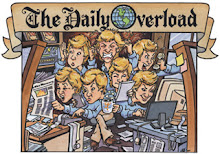Politics by attack
Politics in this town is becoming increasingly personal and divisive. The factions no longer fall strictly along party lines. On Election Night, there were at least five different alliances gathering separately -- three groups of Republicans and two of Democrats.
In some cases, individuals who worked together on campaigns in the past this time attacked each other in published comments, conversation and at the polls.
The rhetoric became so severe at one polling place that first a sheriff’s representative was called and then the local police department to warn a former public official that her strongly worded opinions were getting close to voter intimidation.
The attacks were often not sanctioned by a candidate or a party, but were lodged on a battlefield of personalities. On Election Eve, campaign signs for both Pottstown Democratic mayoral candidates were shredded, apparently by supporters acting without the candidates’ knowledge.
In another case, signs with one person’s name and a hash mark through it appeared overnight throughout town in what can only be characterized as a personal smear campaign.
More than one faction tried to use this newspaper as a battleground as well, dropping off photocopies of old news articles, calling with tips, and emailing messages about candidates’ relatives, business dealings and suspected motives.
“You owe it to Pottstown to report on this ...’’ or “You need to look into this ...” were then followed by innuendo that we were choosing sides by not reporting on unsubstantiated rumor or half-truths.
Even news photos taken at a borough council meeting or the recent neighborhood cleanup were seen as favoring one side or another.
Some of this was not new. Hard-fought local elections are bound to result in disagreement about the handling of a campaign by supporters, candidates and the press.
But, a difference this year -- and a signal of a disturbing trend -- is the increasing willingness to hide behind anonymity, to act under the cover of night instead of speaking opening and acting in daylight.
Enter digital communication, and the ripples threaten to become a tidal wave.
The Mercury Web site, www.pottsmerc.com, is intended to be a place where readers can interact electronically and add their feedback to the news online.
What we witnessed in this election is that some people found a way to take advantage of that opportunity by posting comments that would otherwise never pass a newspaper litmus test of legitimacy.
The commenting function of the Web site became a spot to park candidate endorsements on every local news story, regardless of topic. A clever way to get a message out there, but a little conniving as well.
Sound Off is the print version of Web comments, also unsigned and also inherently susceptible to being abused.
Both features, as well as letters to the editor and our ongoing news coverage of local issues, are intended to spur public debate, to involve citizens, and ultimately result in people working together toward better communities. The ability to have an opinion printed or posted online is a right of free speech that we uphold as critical both to this democracy and to the sharing of ideas within our community.
But when those voices become mean-spirited against other individuals, when the forum is about personalities instead of issues, when debate becomes attack, the community as a whole suffers instead of prospers.
This is not a new message, but it bears repeating: Pottstown does not do itself any favors by continuing down a path of divisiveness and attack. In an election, it’s bad politics. In a community, it’s bad form.
 RSS
RSS


